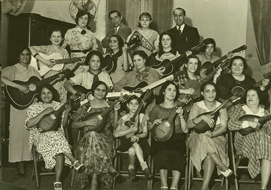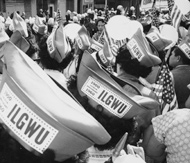

History of the ILGWU
ILGWU and the Arts

Many ILGWU members were involved in the performing, studio, and musical arts through union programs offered by locals as well as the international office. In many instances, their productions and performances were enjoyed among local union members, within a city or regional community, or at an international union convention. Members in local unions staged plays, organized mandolin orchestras, and sang in choruses. Their activities were part of the ILGWU's robust educational program, which coordinated courses not only on labor history and political philosophy, but art and music classes, as well as physical education courses and team sports.
At several times throughout the twentieth century, the ILGWU was nationally recognizable for its work in the arts. In 1937, the musical production Pins and Needles opened at the ILGWU-operated Labor Stage Theater. With music and lyrics by Harold Rome and primarily a cast of ILGWU members, the revue that satirized political reactionaries was a hit. The New York Times described it as "a witty and tuneful morsel considerably enhanced by the infectious enthusiasm of the cast and a thoroughly workmanlike job on the technical end." After its initial run at the Labor Stage, the production continued at the Windsor Theater, and when all was said and done, the cast and crew had staged over 1,000 performances. The success of the production continued, with a national tour and an invitation to the White House.
In 1950, in celebration of the ILGWU's 50th anniversary, the feature film With These Hands premiered at the union's Golden Jubilee convention. Produced by Jack Arnold and Lee Goodman, the film told the story of the union's first fifty years through the eyes of a member who was about to retire. After the convention, With These Hands screened at theaters in cities and towns throughout the country. Also at the 1950 convention, the Northeast Department of the ILGWU presented the musical narrative My Name is Mary Brown. Based on the text of Justice editor Leon Stein and directed and produced by James Corbett and Michael Johnson, the play depicted the lives of garment workers, as told by character Mary Brown who represented workers in the Northeast Department. These two productions were major elements of the spectacle and celebration at the ILGWU's Golden Jubilee Convention in Atlantic City.
In 1975, the ILGWU began an aggressive campaign to promote the Union Label. This effort focused on two messages, "The symbol of decency, fair labor standards and the American way of life," and "Buy union-made products, the job you save may be your own," and was communicated in a variety of print media, as well as on radio and television. In these commercials, members of the ILGWU Chorus sung the "Union Label" song and thus the tune became a familiar sound to American viewers. Noteworthy is the fact that union members had been singing in the ILGWU Chorus for decades, performing at union conventions, May Day parades, and for special guests and special occasions. With the 1975 Union Label campaign in print, radio, and television, however, ILGWU performances reached a larger audience than ever before.


